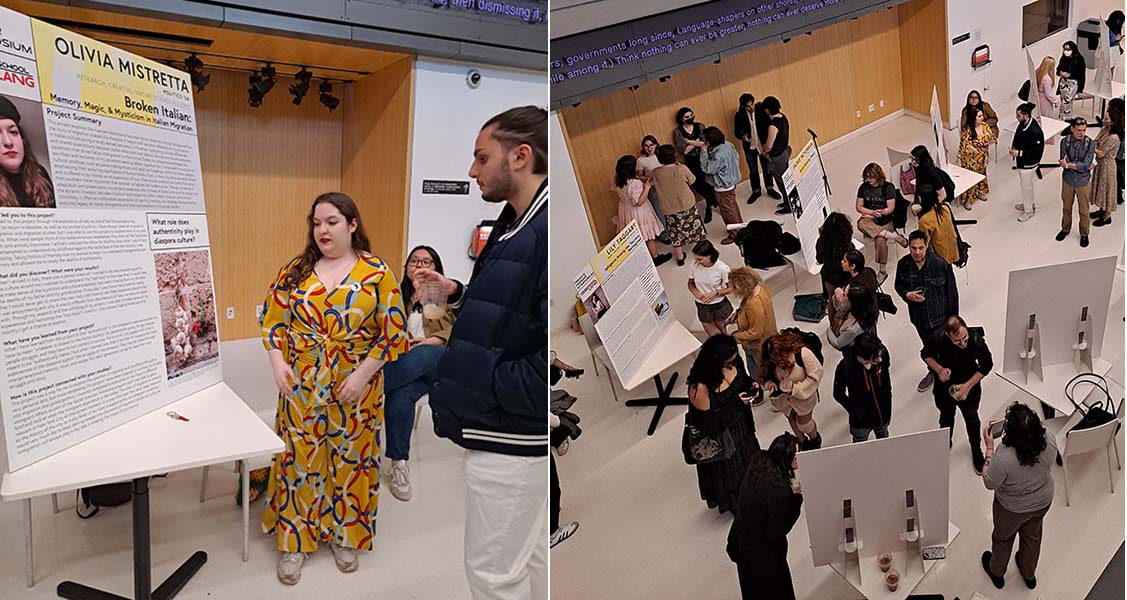
Eugene Lang Dean’s Honor Symposium Celebrates Undergraduate Research in the Liberal Arts
Conventional wisdom holds that the best way to grasp a concept is to explain it to someone else. Putting that idea into practice, the Lang Dean’s Honor Symposium gave 25 students the opportunity to develop subject mastery by learning how to present the results of their original research projects. Students from across Lang’s academic programs were able to develop skills that will help them make the transition from students to scholars, professionals, researchers, or artists. Part of the university’s Spark initiative, the Dean’s Honor Symposium is one of several events happening from now through Commencement that showcase the outstanding work of New School students, faculty, and staff.
“I was delighted to be able to work with Lang students as a panel faculty advisor and witness firsthand how our students are able to apply what they have learned to create sophisticated research that addresses some of the most challenging issues facing the world. The New School encourages students at all levels to think critically and take charge of their own academic and creative development, and this symposium demonstrates the incredible scholarship and creativity of our undergraduate students,” says Dr. Renée T. White, provost and executive vice president for Academic Affairs.
The symposium consists of a poster session and panels. Interested students applied to the program during the fall semester, and those selected were matched with faculty advisors who guided them in mastering academic discourse and scholarly presentation. “I was initially drawn to participating in the Dean’s Honor Symposium because it provided an opportunity to present my creative projects in a way that really highlights all of the background research and scholarship behind the scenes,” says Ruth Donagher, BA Environmental Studies/BFA Fashion Design ’25. “Showing creative work in a more traditional portfolio setting is wonderful, but the symposium is special because of the repeated practice and feedback I was able to receive in terms of representing all aspects of my practice rather than just the finished outcome.”
The panels allow Lang to strengthen its interdisciplinary academic community as students are grouped according to the focus of their research rather than their academic major. In working together on the Dean’s Honor Symposium, faculty advisors and students learn from one another and engage in the kind of exchanges that reflect the collaborative model that is integral to Lang. Rama Lapidus, BA Liberal Arts ’24, who participated for the third time in the symposium—and for the second time as a panelist—finds the entire experience valuable and enlightening. “Being in this space allows us to learn and discuss with students that we otherwise likely wouldn’t get a chance to interact with. I love that despite what we are focusing on in our studies overall, and even in our projects for the symposium, we always find a way to build and connect over a passion for activism and care for the broader world. I learn so much and gain immense inspiration each year from everyone involved in the symposium, and of course my fellow panelists,” she says.
Julianna Padilla, BA Journalism + Design ’26, found the symposium an invigorating process that opened her up to a multitude of viewpoints. “I usually spend time only researching one point of view, usually what I’m writing about. But for my topic, misogyny in Catholicism and how it affects the U.S. government, I had to see the full picture. I watched documentaries, watched videos of politicians, and read many articles on the effects of religion on today’s political atmosphere.”
The symposium also enabled Michael Kpade, BA Economics ’26, to view his research through different lenses. “I certainly learned to look at the content of my work from different significant angles—especially, in my case, learning to talk about diaspora identities from historical, performative, and cultural dimensions. I learned to present my work in a way that left room for qualification from these valid disciplines.” Chloe Huggins, BA Screen Studies ’24, says, “I learned so much about working with other students and how important diversity of thought is. These days it is important to have a platform to share your point of view while also listening to others to help you learn and grow.”
Faculty advisor Stephanie Browner, a professor of literary studies, finds that participating in the symposium is an excellent way for students to hone their ability to assess their own and others’ work, give and receive feedback and refine their projects over a series of weeks. “What I witnessed was an organic refining of the projects as they read their essays aloud, listened to themselves, and listened to their peers read their essays. Witnessing others refine work while also working on your own makes the process more intuitive. The panel also gave each other feedback—both general impressions and sometimes specific comments. And twice first-year students in Writing the Essay 2 attended and shared what they liked, what might make each presentation stronger. The panelists did not automatically accept all comments and revise exactly in response to feedback. Rather, there was space to share work, hear responses, and repeat that process over nine weeks.”
Whether students move on to careers in theater, technology, or academia, the skills they acquire as they organize accessible presentations of complex information will serve them throughout their lives.